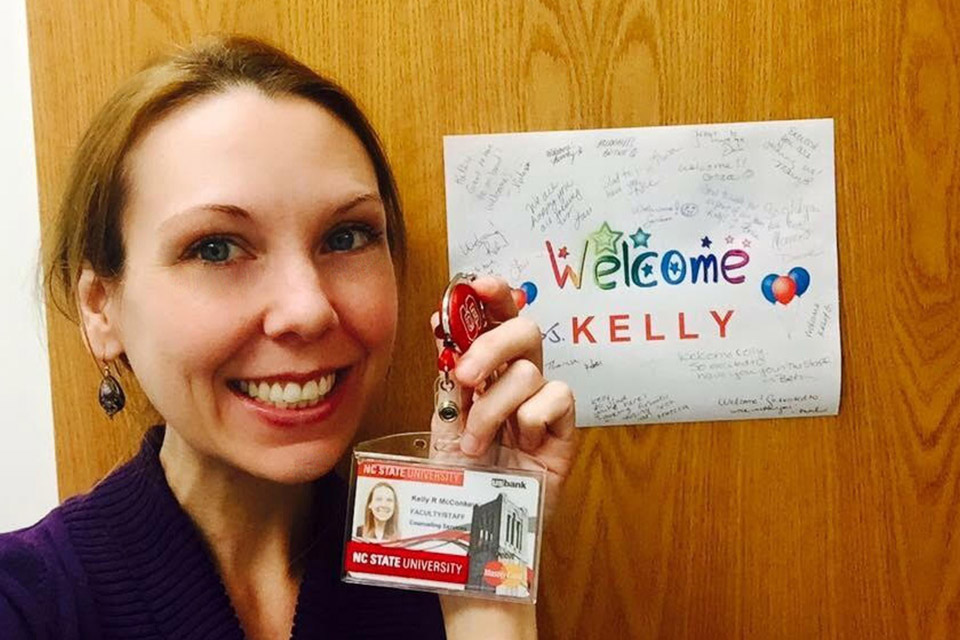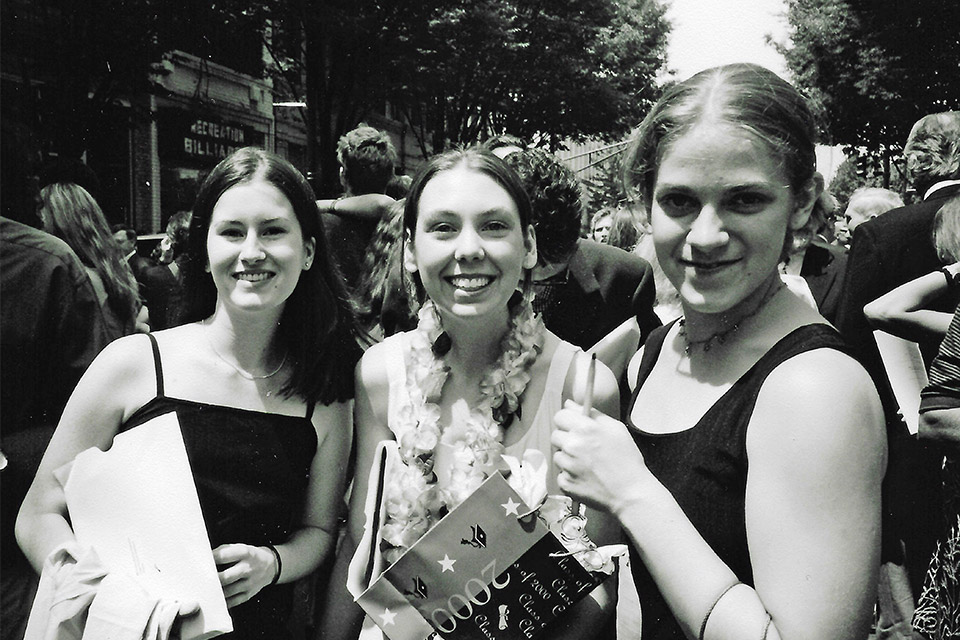Drama alumna uses art as a tool for healing
At North Carolina State University, art is for everyone. Or at least that’s part of UNCSA alumna Kelly McConkey’s mission as an expressive arts therapist in the university’s Counseling Center. Her weekly Free Expression Sessions invite students from across campus to explore how creative expression can relieve stress and foster self-reflection and community.
McConkey, a 2000 graduate of the High School Drama program, has a master’s degree in Clinical Mental Health Counseling with a post-master’s certification in Expressive Arts Therapy from Appalachian State University. She shares how her studies as an actor helped her understand the power of empathy and led her to a career connecting students from all disciplines to the arts.
How did you become interested in Expressive Arts Therapy?
Originally, I wanted to do Drama Therapy because of my own history in the theatre and how it connected to my passion for counseling. When I was exploring master’s programs I came across Expressive Arts Therapy. I had never heard of it before, but the more I researched it, the more excited I became about wanting to pursue it. Expressive Arts Therapy encompasses several art forms—drama, music, dance, visual art forms and narrative/poetry. It focuses on the individual’s process of creation, as opposed to interpretation of the product that is created. There can be a flow between the different forms, creating an intermodal exploration, which I feel deepens the process.

Kelly McConkey on her first day of work at North Carolina State University (NCSU).
Describe your work at NCSU and how Expressive Arts Therapy benefits students:
Every Wednesday, students are invited to attend free expression sessions. This is a drop-in group, meaning students do not need to sign up, they just show up. We usually have anywhere from 6 to 20 or more students attend. Each week we explore a different topic. This could be stress management, self-esteem, grief, healthy relationships, anxiety, coping skills, etc. Students are invited to use the art supplies to “freely express” their own interpretation and perception of the topic.
Students may use clay, paint, collage, narrative, poetry, music or movement to explore. This allows students to practice self-reflection and find a deeper understanding of how they view themselves as individuals, their relationships with others and their connection to the world around them. It can provide insight into personal desires, needs and goals. Many of the students who attend also take advantage of individual therapy, where they can take the insights they gain through their art and incorporate them into the work they do in therapy and in life.
I also collaborate with other centers on campus. For example, this year I collaborated with NCSU’s Women’s Center to provide expressive arts programming during National Eating Disorder Awareness week and Sexual Assault Awareness month.
How do you apply what you learned at UNCSA in your career?
At UNCSA I learned that to be a great actor, you have to really understand the characters you play. Even with the most difficult characters, you must seek to find empathy. You have to strive to understand their needs, their goals and their intentions. You have to see them both as an individual, but also as a piece of the larger community within the play; to recognize how their relationships affect them and shape them.
At UNCSA I learned that to be a great actor, you have to really understand the characters you play. Even with the most difficult characters, you must seek to find empathy. You have to strive to understand their needs, their goals and their intentions... As a counselor, this is what I am doing with the people I work with—striving to see their whole selves.
Kelly McConkey
As a counselor, this is what I am doing with the people I work with—striving to see their whole selves. Also, I completed my year-long master’s internship at the UNCSA Counseling Center, so the university truly has continuously played a role in helping me to grow in my profession.
Why did you choose UNCSA for high school?
When I was around 8 years old I went to see a play with my mom. A man in the play was advertising acting lessons for kids and she asked if I wanted to sign up. At the time I was rather shy, but I said yes. His name was Hal Hudson. He was amazing. He helped me build confidence in myself and, through my work with him, I fell in love with acting. He passed away when I was 12, but his influence has never left me. He was a UNCSA alumnus. I knew he had loved his time at the School of the Arts, so I wanted to go there, too.
On top of that, the school’s reputation was superb and my brother was a student at Wake Forest University down the road, so my parents were on board. The day I was accepted, I remember feeling so proud. I knew Hal would have been proud, too.
UNCSA is in a unique location. What surprised you about practicing your art in this area?
I grew up in a small town outside of Raleigh, North Carolina, that lacked diversity. So, I think the most surprising and rewarding thing about UNCSA being where it is, is that it allowed me to stay in North Carolina, while also allowing me to work with people from all around the world with different backgrounds and identities.
Share a significant memory and/or campus spot.
There are so many… Laying out under a small grove of trees where my best friend Michelle and I would listen to Ani DiFranco and talk about life; learning how to juggle; Tanya Belov telling me to never be ashamed of my voice; and falling in love with a college ballet dancer. I have to admit, one of my favorite campus spots was on top of the roof watching the sunset, but technically we were not supposed to be up there!

Kelly McConkey, center, with friends after her UNCSA graduation at the Stevens Center.
Talk a little about some challenges you've encountered in your career and how you've overcome them:
As a counselor you hear every kind of story. When I first started, one of the biggest challenges was learning how to create emotional boundaries for myself. Some of the stories you hold for others will rip your heart out and make you question humanity, so you have to really find your own ways of holding other people’s pain, while not letting it consume you. I do this through mindfulness practices, yoga, art, having my own therapist (which I personally feel every counselor should have) and nurturing positive relationships and experiences I have in my life.
What advice would you give current or prospective UNCSA students?
Go to the counseling center. Every single one of you. Never be afraid to ask for help, because every single person that has ever been or will ever be, has needed a little help from time to time. Your mental wellness matters and it will be tested, so go!
If you could do something on your bucket list right now, what would it be?
Play Madame de Tourvel in “Les Liaisons Dangereuses” or backpack around Ireland.
June 13, 2018






